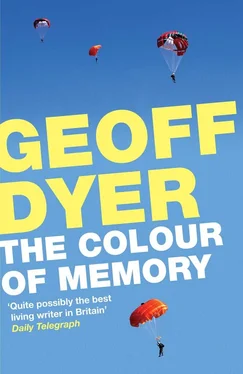Ed rolled a cigarette and grunted that he couldn’t believe how naive Steranko was, that he wasn’t living in the real world, that he had no involvement in politics.
‘That’s junk,’ said Steranko. ‘I’m up to my neck in politics.’
‘Bollocks.’
‘Listen, I’ll tell you how I’m involved in politics: I never eat at McDonald’s, I never play electronic games, I’ve not seen five minutes of soap opera on television or any of the other shit they put out. I try not to listen to pop music, I never listen to Radio 1; I don’t read the review pages of Sunday papers. I don’t buy any South African goods, I don’t own a car and generally I don’t spend any money on the kind of crap shops are full of. I’ve no interest in getting a proper job and I don’t care if I never own my own house — when people talk about house prices I don’t listen. I don’t know any bankers or any people who work in advertising — I’ve only even been to the City once. If somebody is reading a tabloid newspaper I try to make sure I don’t see it. OK? Now we come to the really important things: I spend quite a lot of time painting and thinking about art. In other words I try not to go blind. I don’t read shit books and I never go to shit films. I play as much sport as I can and I listen to Coltrane, Sonny Rollins, Lester Bowie, Beethoven and Shostakovitch — in other words I try not to let myself go deaf. You get the picture? I’m engaged in some of the most important political battles of our time.’
I laughed but it was difficult to tell whether Steranko was serious or not. Ed wasn’t having it either way.
‘You’re the most arrogant fucking wanker I’ve ever met,’ he said and trudged off to the other bar.
‘I do talk some shit sometimes,’ Steranko said.
‘You’re just a garret radical,’ I said laughing, as everyone made room for us back at the table. Freddie was telling Belinda about his book.
‘It’s all autobiographical,’ he said. ‘The narrator is an influential jazz critic who sleeps with lots of trendy women.’
‘No, what’s it like really? Is there a plot?’
‘Oh no there’s no plot. I hate plots. Plots are what get people killed. Generally the plots are the worst thing about books. It’s such a bore the way that in chapter eleven or whatever somebody always has to get hold of a gun. Plots are what you get on television: there’s no need for them these days.’
‘How much have you written?’
‘Not much at all. You don’t fancy taking a stab at it do you?’
Steranko had his arm around Foomie’s shoulders; Carlton was talking to someone I didn’t know. The pub was full of the noise of laughing and chinking glasses and the ringing of the till. There was hardly room to move. People bought each other drinks and no one wanted to fight. Freddie bought a huge round and I realised that I loved piss-ups even more than I did a year ago. I looked up at the Christmas streamers and the balloons, the tinsel lanterns and the brightly coloured balls. The hubbub of the pub was all around me and again I had the odd sense that I’d had on the football pitch, of time standing still for a fraction of a second. Looking up I saw the ceiling fan slow and stop, the blur of movement replaced by the sharp image of its four stationary blades — a spider’s web strung taut as a net between them.
In the post was a summons to the Magistrates’ Court for non-payment of rates I’d already been assured I didn’t owe. Four months ago they’d written to confirm that I wouldn’t have to pay any rates. Then they asked me for five hundred quid. I wrote back explaining that they’d already told me I didn’t owe any rates. Another demand arrived. I wrote again. They sent another demand. I wrote again. None of these letters of mine were acknowledged — as though the place sending the demands didn’t actually exist.
When the summons arrived I phoned the rates office but there was no answer. I went down to the office but as soon as I began speaking a man in uniform waved his hand to silence me and pointed to a notice explaining that no enquiries could be dealt with because of an industrial dispute. I sat down in the corridor, wrote another letter and dumped it in a rubbish bin marked ‘Post’.
Back home I ate a dismal plate of beans on toast and drank a mug of tea. Under the prison glare of the bare lightbulb, tiny bubbles of grease floated on the brown surface of the liquid.
On the news there was an item about anti-hunt demonstrators somewhere in the home counties. The huntsmen were all decked out sedately in their red riding gear, the hounds all yapping and panting while the demonstrators tried to get in the way and make a nuisance of themselves. In close-up one of the demonstrators was yelling ‘Scab! Scab!’
In recent years the word had become an all-purpose term of abuse for any situation in which one group of people wanted to move while another group wished them to remain stationary. So frequently had the word been used that it no longer carried any pejorative weight as far as the scabs were concerned. Its moral edge had been blunted and now it sounded like an aggressive greeting that was also an exclamation of pain, defeat and humiliation on the behalf of the person uttering it. It was something you shouted when the lorries or strike-breakers had already driven past under police escort. There was almost something elegiac about it, a nostalgic appeal to the word’s own lost moral and political authority, like a fading echo on a cold day, trying to call its way back to the lost warmth of the mouth.
On Christmas Eve Steranko invited everyone over to his house for a turkey dinner. We all sat around the kitchen table which he had dismantled, hauled up the stairs and then reassembled in his room. A fire was burning in the grate and more wood was piled up on either side of the fireplace. All the usual clutter of his room had been cleared away and thrown on his bed or shoved into corners: notebooks, sketch pads, paperback novels. As always the walls were covered with unfinished drawings; canvases were stacked up in a corner. Apart from the fire the only light in the room was from candles on the table and on the mantelpiece. He had even bought some cheap Christmas crackers. Everyone had brought booze and grass and we were all drunk and stoned by the time Steranko emerged from the kitchen bearing the turkey ceremoniously before him like a crown on a cushion. The roast potatoes and turkey had been cooked a deep golden brown. There was gravy, broccoli, peas and boiled potatoes. We ate like pigs and swilled back more glasses of red wine. When we had finished the turkey we pulled the crackers and all put the coloured paper hats on our heads. Freddie announced that the other day he’d met someone who was commissioning editor at a place where they did the mottoes for Christmas crackers and he reckoned he’d be pushing some work his way. Everyone laughed and we all compared the pointless trinkets that dropped out of the crackers: a gondola, a chandelier, a parachutist, a bicycle, a saxophone.
After clearing the plates away we devoured the box of expensive chocolates that Belinda had brought. We played our favourite records, drank a bottle of port and took it in turns to try and break brazil nuts with Steranko’s nutcrackers. The table quickly became congested with empty beer cans, bags of grass, corks, wine bottles, nutshells and screwed-up chocolate wrappers. There were six of us: Carlton, Foomie, Freddie, Belinda, Steranko and me.
Through the window I could see the yellow glow of the street lamp and above that a cold sickle of moon. The fire filled the room with warm light. Propped carelessly on the mantelpiece was a postcard of Millais’ ‘Burning Leaves’: the pale light fading, the leaves burning, the trees receding, the girls’ faces touched by the light.
Читать дальше












